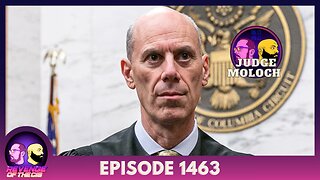Premium Only Content

Cornelius Agrippa
Heinrich Cornelius Agrippa von Nettesheim, 1486-1535, German mystic and alchemist.
Agrippa of Nettesheim was born of a once-noble family near Cologne and studied both medicine and law there, apparently without taking a degree.
In 1503, he assumed the name, Cornelius Agrippa von Nettesheim, adopting the von to suggest a noble background; three years later, he established a secret society in Paris devoted to astrology, magic, and Kabbalah.
His career is diverse: secret agent, soldier, physician, orator, and law professor, in Cologne, Paris, Dôle, London, Italy, Pavia, and Metz.
In 1509, he set up a laboratory in Dôle in the hopes of synthesizing gold, and for the next decade or so traveled Europe, making a living as an alchemist, and conversing with such important early humanist scholars as Colet and Reuchlin.
In 1520, he set up a medical practice in Geneva, and in 1524 became a personal physician to the queen mother at the court of King Francis I in Lyons.
When the queen mother abandoned him, he began practicing medicine in Antwerp, but was later banned for practicing without a license, and became a historiographer at the court of Charles V.
After several stays in prison, variously for debt and criminal offenses, he died in 1535.
Agrippa’s wrote on a great many topics, including marriage and military engineering, but his most important work is the three-volume De occulta philosophiae (written c. 1510, published 1531), a defense of “hidden philosophy” or magic, which draws on diverse mystical traditions — alchemy, astrology, Kabbalah.
A later work, De incertitude et validate Scientiarum (Of the Uncertainty and Vanity of the Sciences), attacks contemporary scientific theory and practice.
Many of his opinions were controversial.
His early lectures on theology angered the Church, and his defense of a woman accused of witchcraft in 1520 led to his being hounded out of Cologne Cologne by the Inquisition.
In his own day, Agrippa was widely attacked as a charlatan.
After his death, legends about him were plentiful. Some believed him to be not only an alchemist but a demonic magician, even a vampire. In one account, he traveled to the New World.
In 1799, Robert Southey published an amusing ballad on this man, suggestive of his later reputation as a master of black magic, as well as of his susceptibility to gothic trappings.
Percy Bysshe Shelley listed Agrippa and Paracelsus among his favorite writers in a discussion with Godwin in 1812.
-
 9:21
9:21
asolitarypagan.com
1 year agoMaking Herbal Salves
1.81K -
 LIVE
LIVE
2 MIKES LIVE
2 hours ago2 MIKES LIVE #196 Deep Dive Monday!
204 watching -
 1:34:27
1:34:27
The Officer Tatum
3 hours agoLIVE: TRUTH About Mahmoud Khalil, Leftists LOSE IT OVER Maga Hat, Bill Maher to MEET Trump | EP 84
34.8K15 -
 2:02:38
2:02:38
Revenge of the Cis
5 hours agoEpisode 1463: Judge Moloch
36.6K8 -
 28:53
28:53
Kimberly Guilfoyle
6 hours agoInside the JFK Files with Roger Stone | Ep. 207
48.4K15 -
 1:21:07
1:21:07
vivafrei
8 hours agoRFK Jr. to Ban Pharma Ads? Pierre Poilievre Rally CRUSHING IT? The Boasberg Battle & MORE!
155K104 -
 1:04:24
1:04:24
In The Litter Box w/ Jewels & Catturd
1 day agoCONFLICT OF INTEREST | In the Litter Box w/ Jewels & Catturd – Ep. 767 – 3/24/2025
68.5K39 -
 2:14:54
2:14:54
The Quartering
7 hours agoAbsurd Epstein File Update, Trump Vs Supreme Court, Our Massive Giveaway, SodaGate & More!
282K443 -
 1:14:03
1:14:03
The HotSeat
4 hours agoOperation LET THEM SPEAK + Your Calls!
30.8K4 -
 34:44
34:44
LFA TV
4 hours agoMIRACLES DO HAPPEN!
20.6K